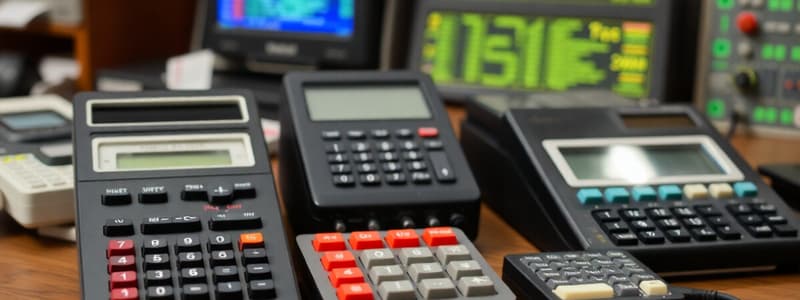Podcast
Questions and Answers
What was the primary motivation behind the invention of the abacus?
What was the primary motivation behind the invention of the abacus?
- To replace human tax collectors.
- To create decorative wooden racks.
- To visualize and perform basic arithmetic calculations. (correct)
- To automate complex mathematical theories.
Which of the following best describes Pascal's contribution to the history of computers?
Which of the following best describes Pascal's contribution to the history of computers?
- He developed the first digital computer.
- He created the first mechanical calculator using moving parts. (correct)
- He invented the abacus.
- He designed the calculation engine.
What fundamental concept, still relevant in modern computers, was introduced by Charles Babbage's calculation engine?
What fundamental concept, still relevant in modern computers, was introduced by Charles Babbage's calculation engine?
- The exclusion of memory for computation.
- The reliance on manual gear movements.
- The integration of input, processor, memory, and output components. (correct)
- The use of beads for calculations.
Ada Lovelace is recognized for her early and significant role in computing history primarily because she:
Ada Lovelace is recognized for her early and significant role in computing history primarily because she:
What marked a key shift in the evolution of computers from the calculation engine era?
What marked a key shift in the evolution of computers from the calculation engine era?
How did the physical scale of computers change during the 20th century?
How did the physical scale of computers change during the 20th century?
What was the original meaning of the term 'computer' before the 20th century?
What was the original meaning of the term 'computer' before the 20th century?
What technological advancement replaced switches in later computer development, leading to greater miniaturization?
What technological advancement replaced switches in later computer development, leading to greater miniaturization?
Pascal's mechanical calculator, a significant step in computing history, primarily used what mechanism for calculations?
Pascal's mechanical calculator, a significant step in computing history, primarily used what mechanism for calculations?
Ada Lovelace's predictions about the future of digital technology included the possibility of digitizing which forms of media?
Ada Lovelace's predictions about the future of digital technology included the possibility of digitizing which forms of media?
Flashcards
Abacus
Abacus
A device used for mathematical calculations, typically involving beads on a rack.
Computer (17th Century)
Computer (17th Century)
A person who performs calculations or computations.
Pascal's Calculator
Pascal's Calculator
A mechanical device that used moving parts to perform addition and subtraction.
Calculation Engine (Babbage)
Calculation Engine (Babbage)
Signup and view all the flashcards
Digital
Digital
Signup and view all the flashcards
First Computer Programmer (Ada Lovelace)
First Computer Programmer (Ada Lovelace)
Signup and view all the flashcards
Computer Chip
Computer Chip
Signup and view all the flashcards
Computer (20th Century)
Computer (20th Century)
Signup and view all the flashcards
Early 20th Century Computers
Early 20th Century Computers
Signup and view all the flashcards
Computer Evolution
Computer Evolution
Signup and view all the flashcards
Study Notes
History of Computers
- Early calculators like the abacus were used for basic math calculations, moving beads on a wooden rack.
- The abacus is still used today.
17th Century Calculators
- Pascal created a mechanical calculator to assist with his father's tax-collection calculations.
- This was a significant advancement, using gears to perform addition and subtraction.
- "Computer" initially referred to a person who performed calculations.
19th Century Calculating Engines
- Babbage's calculating engine was a complex machine with input, processor, memory, and output components.
- These components are still fundamental to modern computers.
- Further developments involved replacing mechanical parts with switches controlled by numbers, marking a key shift to "digital" technology.
- Ada Lovelace is the first computer programmer, writing sequences for future computers and predicted the digitalization of sound, music, text, and images.
20th-21st Century Computers
-
Early computers were large room-sized machines requiring teams to operate.
-
Limited to the Army and large organizations initially.
-
Computers became progressively smaller, faster, and cheaper over time.
-
Mass availability through PCs defined the 21st century.
-
Software development broadened and made computers more versatile.
-
Modern computers facilitate a range of tasks, from gaming and navigation to home automation.
-
Advancement in technology has made it possible to take pictures, read books, and perform diverse tasks through computers.
Studying That Suits You
Use AI to generate personalized quizzes and flashcards to suit your learning preferences.




